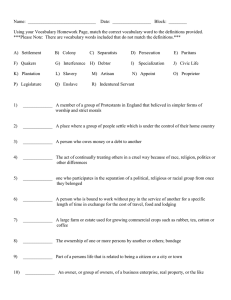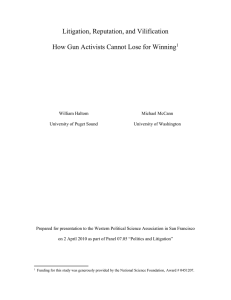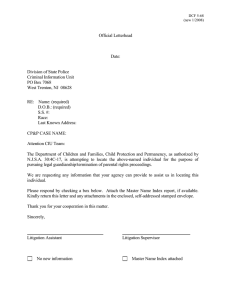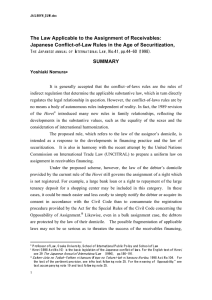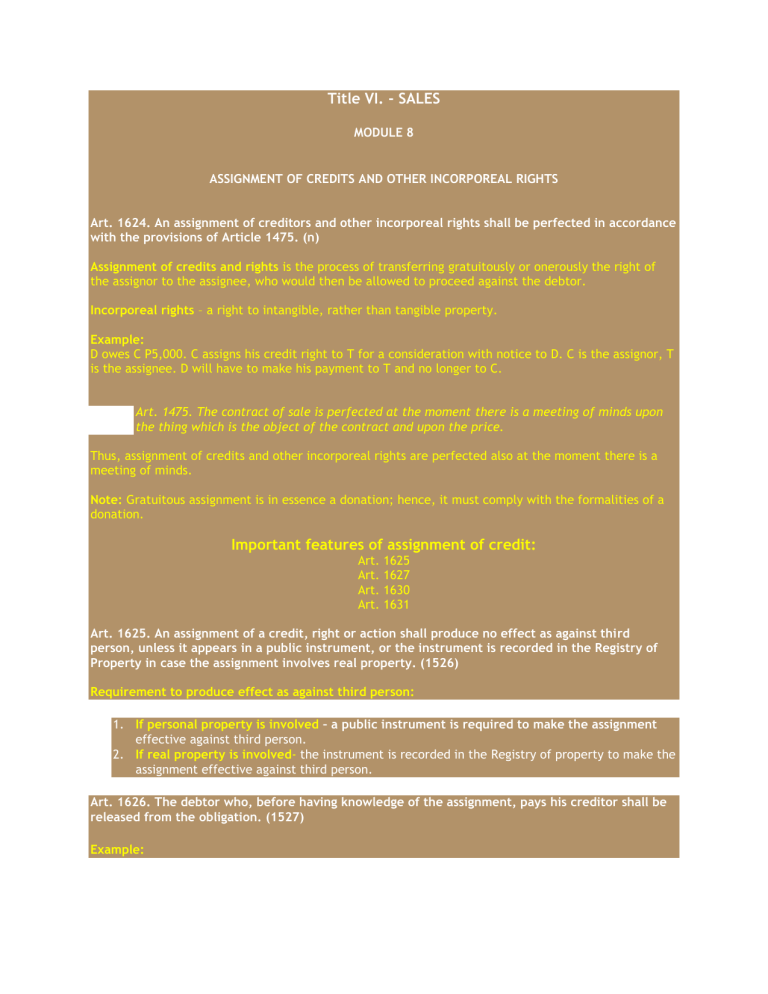
Title VI. - SALES MODULE 8 ASSIGNMENT OF CREDITS AND OTHER INCORPOREAL RIGHTS Art. 1624. An assignment of creditors and other incorporeal rights shall be perfected in accordance with the provisions of Article 1475. (n) Assignment of credits and rights is the process of transferring gratuitously or onerously the right of the assignor to the assignee, who would then be allowed to proceed against the debtor. Incorporeal rights – a right to intangible, rather than tangible property. Example: D owes C P5,000. C assigns his credit right to T for a consideration with notice to D. C is the assignor, T is the assignee. D will have to make his payment to T and no longer to C. Art. 1475. The contract of sale is perfected at the moment there is a meeting of minds upon the thing which is the object of the contract and upon the price. Thus, assignment of credits and other incorporeal rights are perfected also at the moment there is a meeting of minds. Note: Gratuitous assignment is in essence a donation; hence, it must comply with the formalities of a donation. Important features of assignment of credit: Art. 1625 Art. 1627 Art. 1630 Art. 1631 Art. 1625. An assignment of a credit, right or action shall produce no effect as against third person, unless it appears in a public instrument, or the instrument is recorded in the Registry of Property in case the assignment involves real property. (1526) Requirement to produce effect as against third person: 1. If personal property is involved – a public instrument is required to make the assignment effective against third person. 2. If real property is involved- the instrument is recorded in the Registry of property to make the assignment effective against third person. Art. 1626. The debtor who, before having knowledge of the assignment, pays his creditor shall be released from the obligation. (1527) Example: D owes C as evidence by a promissory note. Subsequently, C assigns his credit to X without the knowledge of D. Thereafter, D pays C. Question: Is the obligation of D extinguished? Answer: Yes, because D pays C before having knowledge of the assignment. The payment to C is valid. Note: Assignment is effective as to the debtor only from the time he has knowledge of it. Art. 1627. The assignment of a credit includes all the accessory rights, such as a guaranty, mortgage, pledge or preference. (1528) Example: D owes C as evidenced by a promissory note. The parties also executed a contract of pledge as security for the loan. Subsequently, C assigns his credit to X. In this case, the assignment is presumed to include the contract of pledge unless otherwise stipulated in their deed of assignment. Rule on : “Accessory follows the principal” Art. 1628. The vendor in good faith shall be responsible for the existence and legality of the credit at the time of the sale, unless it should have been sold as doubtful; but not for the solvency of the debtor, unless it has been so expressly stipulated or unless the insolvency was prior to the sale and of common knowledge. Even in these cases he shall only be liable for the price received and for the expenses specified in No. 1 of Article 1616. The vendor in bad faith shall always be answerable for the payment of all expenses, and for damages. (1529) Warranties of the Assignor of credit: 1. The existence of the credit at the time of assignment. 2. The legality of the credit at the time of the assignment unless the assignor sold it as doubtful; 3. If expressly stipulated or unless the insolvency was prior to the sale and of common knowledge, t he solvency of the debtor. Liabilities for violation of warranties: 1. Assignor in Good faith: a. Price received; b. Expenses of the contract; and c. Any other legitimate payments by reason of the assignment. 2. Assignor in bad Faith a. Payment of the price; b. All the expenses; and c. Damages Art. 1629. In case the assignor in good faith should have made himself responsible for the solvency of the debtor, and the contracting parties should not have agreed upon the duration of the liability, it shall last for one year only, from the time of the assignment if the period had already expired. If the credit should be payable within a term or period which has not yet expired, the liability shall cease one year after the maturity. (1530a) Duration of warranty as to debtor’s solvency: 1. Period stipulated; 2. If there is no stipulation: a. If the period had already expired – One year from the time of the assignment b. If the period has not yet expired- One year from maturity Example: D owes C who assigns the credit to X on January 20, 2021. The loan of D to C is payable on December 11, 2020. It was agreed upon by C and X that the former will be responsible for the solvency of D. If it further stipulated that the duration of the warranty of C will last up to July 11, 2022, then the stipulation will prevail. What if there is no agreement as to the duration of the warranty of C, then the duration of the warranty will last until January 20, 2022 which is one year from the time of assignment. What if the assignment was made on December 11, 2020, then the duration of the warranty will last until December 11, 2021 which is one year from maturity. Art. 1630. One who sells an inheritance without enumerating the things of which it is composed, shall only be answerable for his character as an heir. (1531) The article speaks of present inheritance. The sale of future inheritance is prohibited as a rule. Example: X, after the death of his father, sold his inheritance though its amount has not yet been determined to B, for a consideration of P50,000. After liquidation of the estate nothing was left for X to inherit. Question: Is the sale between X and B valid? Why? Answer: Yes, because this is a sale of hereditary right. The law states “one who sells an inheritance without enumerating the things of which it is composed, shall only be answerable for his character as an heir.” Art. 1631. One who sells for a lump sum the whole of certain rights, rents, or products, shall comply by answering for the legitimacy of the whole in general; but he shall not be obliged to warrant each of the various parts of which it may be composed, except in the case of eviction from the whole or the part of greater value. (1532a) The warranty is on the legitimacy of the whole in general. Art. 1632. Should the vendor have profited by some of the fruits or received anything from the inheritance sold, he shall pay the vendee thereof, if the contrary has not been stipulated. (1533) General Rule: The vendor shall pay the vendee should he have profited by some of the fruits or received anything from the inheritance sold. Exception: The above liability is subject to contrary stipulation. Art. 1633. The vendee shall, on his part, reimburse the vendor for all that the latter may have paid for the debts of and charges on the estate and satisfy the credits he may have against the same, unless there is an agreement to the contrary. (1534) General Rule: The vendee shall, on his part, reimburse the vendor for all that the latter may have paid for the debts of and charges on the estate and satisfy the credits he may have against the same. Exception: The above liability is subject to contrary stipulation. Art. 1634. When a credit or other incorporeal right in litigation is sold, the debtor shall have a right to extinguish it by reimbursing the assignee for the price the latter paid therefor, the judicial costs incurred by him, and the interest on the price from the day on which the same was paid. A credit or other incorporeal right shall be considered in litigation from the time the complaint concerning the same is answered. The debtor may exercise his right within thirty days from the date the assignee demands payment from him. (1535) Example: D owes C the amount of P500,000. On maturity date, C made a demand from D who failed to pay. Thereafter, C filed a complaint and D later on filed an Answer. In this case, the credit can be considered in litigation. While the case is pending, C sold his credit to X for P350,000. Question: What can D do? Answer: D can redeem the credit from X by paying X the sum of P350,000 plus judicial costs paid by X if any, and the interest on the price from the day on which the same was paid. It must be noted that D must redeem within 30 days from the date X demands payment from him. Pendente lite – means “while the action is pending”; “during the proceeding or litigation”, “in a manner contingent on the outcome of the litigation.” Art. 1635. From the provisions of the preceding article shall be excepted the assignments or sales made: (1) To a co-heir or co-owner of the right assigned; (2) To a creditor in payment of his credit; (3) To the possessor of a tenement or piece of land which is subject to the right in litigation assigned. (1536) 1. Assignments or sales made to a co-heir or co-owner of the right assigned. Example: D owes X and Y. Thereafter, despite the demand by X, D did not pay. Hence, X filed a complaint where D filed an Answer. If during the pendency of the litigation, X assigned or sold his credit to Y, D cannot redeem. 2. Assignments or sales made to a creditor in payment of his credit. Example: D owes C. In another contract C also owes X. Despite demand, D failed to pay C; hence, the latter filed a complaint against the former. D timely filed his answer. During the pendency of the litigation, C assigns his credit in favor of X. In this case, D has no right of legal redemption. 3. Assignments or sales made to the possessor of a tenement or piece of land which is subject to the right in litigation assigned. Example: D owes C as evidenced by their contract of loan. Moreover, D executred a contract of real estate mortgage as security to his loan. Upon demand by C, D failed to pay. Thus, C filed a complaint and thereafter D also filed his Answer. Later, D sold the above-stated parcel of land to X. During the pendency of the litigation C assigns his credit to X. In this case, D has no right of legal redemption.
